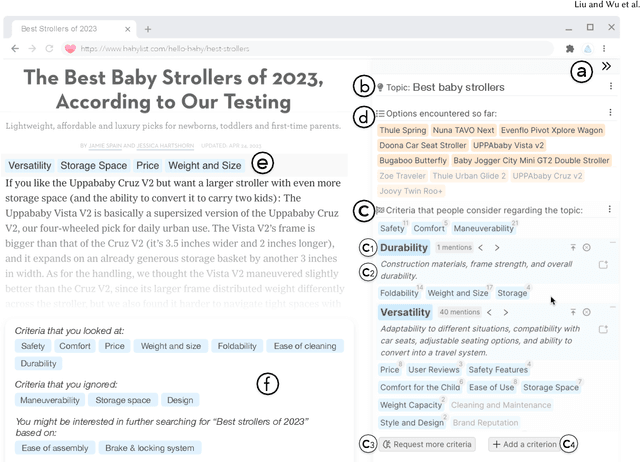Brad A. Myers
Human-AI Interaction Alignment: Designing, Evaluating, and Evolving Value-Centered AI For Reciprocal Human-AI Futures
Dec 25, 2025Abstract:The rapid integration of generative AI into everyday life underscores the need to move beyond unidirectional alignment models that only adapt AI to human values. This workshop focuses on bidirectional human-AI alignment, a dynamic, reciprocal process where humans and AI co-adapt through interaction, evaluation, and value-centered design. Building on our past CHI 2025 BiAlign SIG and ICLR 2025 Workshop, this workshop will bring together interdisciplinary researchers from HCI, AI, social sciences and more domains to advance value-centered AI and reciprocal human-AI collaboration. We focus on embedding human and societal values into alignment research, emphasizing not only steering AI toward human values but also enabling humans to critically engage with and evolve alongside AI systems. Through talks, interdisciplinary discussions, and collaborative activities, participants will explore methods for interactive alignment, frameworks for societal impact evaluation, and strategies for alignment in dynamic contexts. This workshop aims to bridge the disciplines' gaps and establish a shared agenda for responsible, reciprocal human-AI futures.
Understanding Prompt Programming Tasks and Questions
Jul 23, 2025Abstract:Prompting foundation models (FMs) like large language models (LLMs) have enabled new AI-powered software features (e.g., text summarization) that previously were only possible by fine-tuning FMs. Now, developers are embedding prompts in software, known as prompt programs. The process of prompt programming requires the developer to make many changes to their prompt. Yet, the questions developers ask to update their prompt is unknown, despite the answers to these questions affecting how developers plan their changes. With the growing number of research and commercial prompt programming tools, it is unclear whether prompt programmers' needs are being adequately addressed. We address these challenges by developing a taxonomy of 25 tasks prompt programmers do and 51 questions they ask, measuring the importance of each task and question. We interview 16 prompt programmers, observe 8 developers make prompt changes, and survey 50 developers. We then compare the taxonomy with 48 research and commercial tools. We find that prompt programming is not well-supported: all tasks are done manually, and 16 of the 51 questions -- including a majority of the most important ones -- remain unanswered. Based on this, we outline important opportunities for prompt programming tools.
Selenite: Scaffolding Decision Making with Comprehensive Overviews Elicited from Large Language Models
Oct 03, 2023



Abstract:Decision-making in unfamiliar domains can be challenging, demanding considerable user effort to compare different options with respect to various criteria. Prior research and our formative study found that people would benefit from seeing an overview of the information space upfront, such as the criteria that others have previously found useful. However, existing sensemaking tools struggle with the "cold-start" problem -- it not only requires significant input from previous users to generate and share these overviews, but such overviews may also be biased and incomplete. In this work, we introduce a novel system, Selenite, which leverages LLMs as reasoning machines and knowledge retrievers to automatically produce a comprehensive overview of options and criteria to jumpstart users' sensemaking processes. Subsequently, Selenite also adapts as people use it, helping users find, read, and navigate unfamiliar information in a systematic yet personalized manner. Through three studies, we found that Selenite produced accurate and high-quality overviews reliably, significantly accelerated users' information processing, and effectively improved their overall comprehension and sensemaking experience.
Understanding the Usability of AI Programming Assistants
Mar 30, 2023



Abstract:The software engineering community recently has witnessed widespread deployment of AI programming assistants, such as GitHub Copilot. However, in practice, developers do not accept AI programming assistants' initial suggestions at a high frequency. This leaves a number of open questions related to the usability of these tools. To understand developers' practices while using these tools and the important usability challenges they face, we administered a survey to a large population of developers and received responses from a diverse set of 410 developers. Through a mix of qualitative and quantitative analyses, we found that developers are most motivated to use AI programming assistants because they help developers reduce key-strokes, finish programming tasks quickly, and recall syntax, but resonate less with using them to help brainstorm potential solutions. We also found the most important reasons why developers do not use these tools are because these tools do not output code that addresses certain functional or non-functional requirements and because developers have trouble controlling the tool to generate the desired output. Our findings have implications for both creators and users of AI programming assistants, such as designing minimal cognitive effort interactions with these tools to reduce distractions for users while they are programming.
Towards Effective Human-AI Collaboration in GUI-Based Interactive Task Learning Agents
Mar 05, 2020
Abstract:We argue that a key challenge in enabling usable and useful interactive task learning for intelligent agents is to facilitate effective Human-AI collaboration. We reflect on our past 5 years of efforts on designing, developing and studying the SUGILITE system, discuss the issues on incorporating recent advances in AI with HCI principles in mixed-initiative interactions and multi-modal interactions, and summarize the lessons we learned. Lastly, we identify several challenges and opportunities, and describe our ongoing work
 Add to Chrome
Add to Chrome Add to Firefox
Add to Firefox Add to Edge
Add to Edge